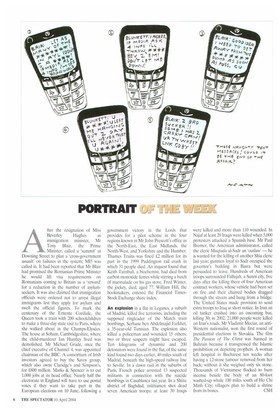PORTRAIT _ r _j_1 71 A fter the resignation of Miss
Beverley Hughes as immigration minister, Mr Tony Blair, the Prime Minister, called a 'summit' at Downing Street to plan a 'cross-government assault' on failures in the system; MIS was called in. It had been reported that Mr Blair had promised the Romanian Prime Minister he would lift visa requirements on Romanians coming to Britain as a 'reward' for a reduction in the number of asylumseekers. It was also claimed that immigration officials were ordered not to arrest illegal immigrants lest they apply for asylum and swell the official figures. To mark the centenary of the Entente Cordiale, the Queen took a train with 200 schoolchildren to make a three-day state visit to Paris, where she walked about in the Champs-Elysées. The house at Soham, Cambridgeshire, where the child-murderer Ian Huntley lived was demolished. Mr Michael Grade, once the chief executive of Channel 4, was appointed chairman of the BBC. A consortium of Irish investors agreed to buy the Savoy group, which also owns Claridge's and Simpson's, for £800 million. Marks & Spencer is to cut 1,000 jobs at its head office. Nearly half the electorate in England will have to use postal votes if they want to take part in the European elections on 10 June, following a government victory in the Lords that provides for a pilot scheme in the four regions known in Mr John Prescott's office as the North-East, the East Midlands, the North-West. and Yorkshire and the Humber. Thames Trains was fined £2 million for its part in the 1999 Paddington rail crash in which 31 people died. An inquest found that Keith Turnbull, a biochemist, had died from carbon monoxide fumes while stirring a batch of marmalade on his gas stove. Fred Winter, the jockey, died, aged 77. William Hill, the bookmakers, entered the Financial TimesStock Exchange share index.
An explosion in a flat in Leganes, a suburb of Madrid, killed five terrorists, including the supposed ringleader of the March train bombings, Serhane ben Abdelmajid Farkhet, a 35-year-old Tunisian. The explosion also killed a policeman and wounded 15 others; two or three suspects might have escaped. Ten kilograms of dynamite and 200 detonators were found in the flat, of the same kind found two days earlier, 40 miles south of Madrid, beneath the high-speed railway line to Seville. In a dawn raid in the suburbs of Paris, French police arrested 13 suspected militants in connection with the suicide bombings in Casablanca last year. In a Shiite district of Baghdad, militiamen shot dead seven American troops; at least 30 Iraqis
were killed and more than 110 wounded. In Najaf at least 20 Iraqis were killed when 5,000 protesters attacked a Spanish base. Mr Paul Bremer, the American administrator, called the cleric Muqtada al-Sadr an 'outlaw' — he is wanted for the killing of another Shia cleric last year; gunmen loyal to Sadr occupied the governor's building in Basra but were persuaded to leave. Hundreds of American troops surrounded Fallujah, a Sunni city, five days after the killing there of four American contract workers, whose vehicle had been set on fire and their charred bodies dragged through the streets and hung from a bridge. The United States made provision to send extra troops to Iraq at short notice. In Iran an oil tanker crashed into an oncoming bus, killing 30; in 2002, 21,000 people were killed on Iran's roads. Mr Vladimir Meciar, an antiWestern nationalist, won the first round of presidential elections in Slovakia. The film The Passion of The Christ was banned in Bahrain because it transgressed the Islamic prohibition on depicting prophets. A woman left hospital in Bucharest ten weeks after having a I2-stone tumour removed from her back; without it she weighed only six stone. Thousands of Vietnamese flocked to burn incense beside the body of an 80-foot washed-up whale 100 miles south of Ho Chi Minh City; villagers plan to build a shrine from its bones. CSH


































































 Previous page
Previous page